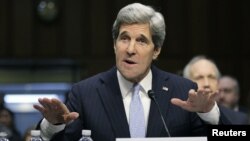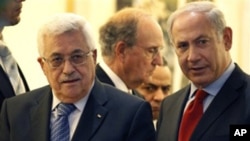More than 40 years ago, U.S. Secretary of State William Rogers proposed a plan for peace between the Israelis and Palestinians and since then, more than a dozen of his successors have worked to negotiate peace between the two sides and failed.
John Kerry, confirmed and sworn in as secretary of State this week, plans to give it another try. During his confirmation hearings, Kerry warned the Senate Foreign Relations Committee that it would be disastrous if the two sides were unable to negotiate a so-called “two-state solution” creating a separate and sovereign Palestinian state alongside Israel.
But given the political and diplomatic situation in the Middle East and Washington, is there any reason to believe Kerry can succeed where so many of his predecessors have failed?
Domestic Impediments
Kerry’s pledge not to “step back” from his commitment to Israel and the Palestinians echoed that of President Barack Obama, who in his 2009 “New Beginnings” speech in Cairo promised to “personally pursue” a two-state solution. Today, that outcome is looking remote.
Ori Nir is spokesperson for the Washington, D.C.-based advocacy group, Americans for Peace Now. He says outgoing Secretary of State Hillary Clinton and U.S. special peace enjoy George Mitchell made serious efforts on behalf of the Obama Administration to bring parties back to the table. “What happened is that Obama encountered pushback both from Prime Minister Benjamin Netanyahu on the Israeli side and to an extent from the Palestinians," he said.
In addition, says Nir, the U.S. leader came under resistance domestically from interest groups inside the United States who “were aligned with the right and extreme right in Israel and were protective mainly of the [Israeli West Bank] settlement enterprise.”
Natan Sachs is a Fellow at the Saban Center for Middle East Policy at the Brookings Institution in Washington, D.C., and is not confidant Kerry will be able to make any real headway.
“As far as we can tell, Senator Kerry appears eager to try and move this forward and perhaps make this his legacy issue. Since the White House is where most decisions are made at the end of the day, a grand approach such as we saw at the beginning of the Obama Administration is unlikely,” Sachs said.
Sachs says most of Obama’s advisers caution the president against any new peace initiative at a time when his plate is so full, both with domestic issues like the economy and foreign policy issues such as Iran and Syria.
That said, no one is betting against another U.S. push on the diplomatic front.
“At the end of the day, there is still a necessity in most people’s view to partition this land—whether it’s done through a full-fledged peace process or whether it’s done by very different means is another question, and I don’t know how it’s going to be done yet,” Sachs said.
Current Impasse
For years, both Israelis and Palestinians have said they want peace, but have blamed the other side for the impasse. In September, 2001, the Palestinian Authority began seeking recognition as a state at the United Nations, something Israel had long opposed. A month later, the so-called Quartet—the U.S., U.N., E.U. and Russia--proposed renewed peace talks, but these failed to materialize over the issue of Israeli settlements.
In January 2012, Israeli and Palestinian negotiators met in Jordan but made no progress toward restarting negotiations. Also in January of last year, the Palestinians won non-member observer state status in the United Nations. Hours later, Israel announced plans to build a new settlement in the contentious E-1 zone east of Jerusalem, an action that the US called “counterproductive.”
Then, in November of last year, Israel was involved in an eight-day battle with Hamas because the militant Palestinian group continued firing rockets at Israeli targets from the Gaza Strip region it controls.
Complicating matters are the results of the recent Israeli election, which saw gains by the religious nationalist right. One beneficiary of those results was Political newcomer Naftali Bennett, founder of the Bayit Yehudi Party. He is calling for Israel to annex what is known as “Area C,” comprising roughly 60 percent of the West Bank, and opposes a Palestinian state in what he refers to in Biblical terms as Judea and Samaria.
Another political newcomer, Yesh Atid Party leader Yair Lapid, says he believes in a two-state solution, if only to prevent the Palestinians living in Israel from becoming more than a minority population. He rejects Palestinian demands for sovereignty over part of East Jerusalem to serve as capital of a new Palestinian nation.
Now what?
Despite the difficulties, Ori Nir still thinks a peace agreement is possible while Kerry is secretary of state.
“Kerry comes in with all the credentials and with all the background to be able to do the right thing… He knows the importance of Israeli-Palestinian peace for America’s national security agenda,” Nir said.
Nir joins other voices who have called for Mr. Obama to take a greater role in the peace process and for him to appoint former President Bill Clinton as a special envoy and negotiator for Middle East peace.
Beyond that, Nir says the U.S. should come out publicly with its own framework and agenda for peace talks. He also believes President Obama should speak directly to Israelis, as he did to Arabs in Cairo in 2009.
“Explaining to them [the Israelis] what’s at stake, what the U.S. can do, what will happen to Israel if it does not pursue peace—that could have an incredibly important impact,” Nir concludes.
Sachs is less optimistic. “The peace process as we knew it is already over. It has been over for some time,” he said, adding that any coalition Prime Minister Netanyahu pulls together I Israel will likely be too polarized to make any significant gains toward peace.
As for the Palestinians, Sachs says, the Palestinian Authority—and Palestinian society itself—remains deeply split, making any movement on that side of the conflict remote.
John Kerry, confirmed and sworn in as secretary of State this week, plans to give it another try. During his confirmation hearings, Kerry warned the Senate Foreign Relations Committee that it would be disastrous if the two sides were unable to negotiate a so-called “two-state solution” creating a separate and sovereign Palestinian state alongside Israel.
But given the political and diplomatic situation in the Middle East and Washington, is there any reason to believe Kerry can succeed where so many of his predecessors have failed?
Domestic Impediments
Kerry’s pledge not to “step back” from his commitment to Israel and the Palestinians echoed that of President Barack Obama, who in his 2009 “New Beginnings” speech in Cairo promised to “personally pursue” a two-state solution. Today, that outcome is looking remote.
Ori Nir is spokesperson for the Washington, D.C.-based advocacy group, Americans for Peace Now. He says outgoing Secretary of State Hillary Clinton and U.S. special peace enjoy George Mitchell made serious efforts on behalf of the Obama Administration to bring parties back to the table. “What happened is that Obama encountered pushback both from Prime Minister Benjamin Netanyahu on the Israeli side and to an extent from the Palestinians," he said.
In addition, says Nir, the U.S. leader came under resistance domestically from interest groups inside the United States who “were aligned with the right and extreme right in Israel and were protective mainly of the [Israeli West Bank] settlement enterprise.”
Natan Sachs is a Fellow at the Saban Center for Middle East Policy at the Brookings Institution in Washington, D.C., and is not confidant Kerry will be able to make any real headway.
“As far as we can tell, Senator Kerry appears eager to try and move this forward and perhaps make this his legacy issue. Since the White House is where most decisions are made at the end of the day, a grand approach such as we saw at the beginning of the Obama Administration is unlikely,” Sachs said.
Sachs says most of Obama’s advisers caution the president against any new peace initiative at a time when his plate is so full, both with domestic issues like the economy and foreign policy issues such as Iran and Syria.
That said, no one is betting against another U.S. push on the diplomatic front.
“At the end of the day, there is still a necessity in most people’s view to partition this land—whether it’s done through a full-fledged peace process or whether it’s done by very different means is another question, and I don’t know how it’s going to be done yet,” Sachs said.
Current Impasse
For years, both Israelis and Palestinians have said they want peace, but have blamed the other side for the impasse. In September, 2001, the Palestinian Authority began seeking recognition as a state at the United Nations, something Israel had long opposed. A month later, the so-called Quartet—the U.S., U.N., E.U. and Russia--proposed renewed peace talks, but these failed to materialize over the issue of Israeli settlements.
In January 2012, Israeli and Palestinian negotiators met in Jordan but made no progress toward restarting negotiations. Also in January of last year, the Palestinians won non-member observer state status in the United Nations. Hours later, Israel announced plans to build a new settlement in the contentious E-1 zone east of Jerusalem, an action that the US called “counterproductive.”
Then, in November of last year, Israel was involved in an eight-day battle with Hamas because the militant Palestinian group continued firing rockets at Israeli targets from the Gaza Strip region it controls.
Complicating matters are the results of the recent Israeli election, which saw gains by the religious nationalist right. One beneficiary of those results was Political newcomer Naftali Bennett, founder of the Bayit Yehudi Party. He is calling for Israel to annex what is known as “Area C,” comprising roughly 60 percent of the West Bank, and opposes a Palestinian state in what he refers to in Biblical terms as Judea and Samaria.
Another political newcomer, Yesh Atid Party leader Yair Lapid, says he believes in a two-state solution, if only to prevent the Palestinians living in Israel from becoming more than a minority population. He rejects Palestinian demands for sovereignty over part of East Jerusalem to serve as capital of a new Palestinian nation.
Now what?
Despite the difficulties, Ori Nir still thinks a peace agreement is possible while Kerry is secretary of state.
“Kerry comes in with all the credentials and with all the background to be able to do the right thing… He knows the importance of Israeli-Palestinian peace for America’s national security agenda,” Nir said.
Nir joins other voices who have called for Mr. Obama to take a greater role in the peace process and for him to appoint former President Bill Clinton as a special envoy and negotiator for Middle East peace.
Beyond that, Nir says the U.S. should come out publicly with its own framework and agenda for peace talks. He also believes President Obama should speak directly to Israelis, as he did to Arabs in Cairo in 2009.
“Explaining to them [the Israelis] what’s at stake, what the U.S. can do, what will happen to Israel if it does not pursue peace—that could have an incredibly important impact,” Nir concludes.
Sachs is less optimistic. “The peace process as we knew it is already over. It has been over for some time,” he said, adding that any coalition Prime Minister Netanyahu pulls together I Israel will likely be too polarized to make any significant gains toward peace.
As for the Palestinians, Sachs says, the Palestinian Authority—and Palestinian society itself—remains deeply split, making any movement on that side of the conflict remote.






